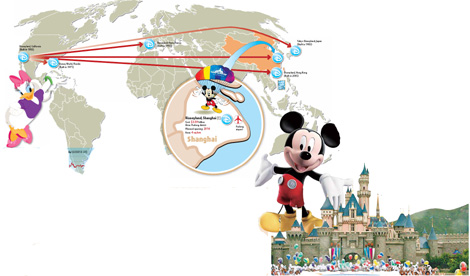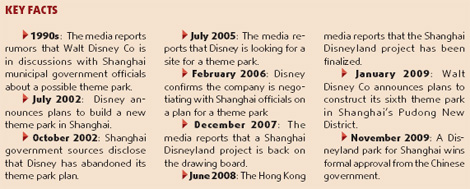

It was a big day for 5-year-old Zhang Xinyu when her mother told her that Mickey Mouse and his friends will have a new home in Shanghai, just miles away from her home.
Dreams of millions of Disney fans in China will come true with the Chinese government's announcement on Nov 4 that a green light has been given to US-based Walt Disney Co to build a Disneyland theme park in the Pudong New District of Shanghai.
But some observers said the new park will pose one more threat to an already embattled amusement park industry.
The first batch of Chinese amusement parks emerged in the 1980s, but most of them have since closed due to fierce market competition and other factors.
"At that time, the government and operators didn't have enough experience, and these parks had a lack of integrated and suitable planning," said Tao Huai, an industry expert and China manager of US-based Premier Rides Inc.
Tao said operators didn't know how to make their parks focus on themes that would attract more tourists instead of just equipping the parks with standard attractions.
Success stories
The Beijing Shijingshan Amusement Park and Shanghai Jinjiang Amusement Park were two success stories at that time, and they still are in operation today.
But as more Chinese people visited first-class theme parks in Europe and the United States, they cultivated more refined tastes, and many old parks back in China gradually lost their appeal, sources said.
Since the mid-1990s, new generations of theme parks have been built in China, including Happy Valley in Beijing, Chendu and Shanghai, Chimelong Park in Guangzhou, Shenzhen Overseas Chinese Town and Suzhou Amusement Land.
Additionally, two port cities, Shenzhen and Tianjin, each bought a retired Soviet aircraft carrier to transform into theme parks.
"Many of them imported advanced concepts of design and planning from abroad, along with fascinating attractions and a scientific management mode," Tao said.
"I could say that some of them are able to compete with their international rivals of medium size," he said.
That is one reason some theme park operators do not feel threatened by another Disneyland in China.
"We take Shanghai Disneyland not as a competitor, but as a foreign counterpart that will inspire us to provide better services," said Cui Zhineng, general manager of Jin Jiang Action Park in Shanghai.
Operators of Shanghai Happy Valley, which opened to the public on Sept 12, also said they would welcome another park to stimulate the local tourism market.
"As a home-grown theme park, we have more products based on the Chinese culture and cater to Chinese visitors, and we cost less," said Ren Kelei, chairman of OCT Enterprise Co, which runs Happy Valley.
Parita Chitakasem is research manager of the Singapore office of market research firm Euromonitor International.
"Competition is already hot in China's theme park industry, so Disney will be up against some very large players," Chitakasem said about the next Disneyland in China.
Local favorites
"In addition to the recently opened Happy Valley, there are many players, including Window of the World in Shenzhen, JinJiang Amusement Park, and Beijing World Park, to name a few, which continue to be favorites and have a strong attendance," she said.
China is home to about 430 medium-sized or larger theme or amusement parks, according to Chinese media reports. By comparison, there are 680 such parks in the United States.
A report by China Investment Consulting said that although North America is the most developed region for the theme park industry, Asia is the fastest developing region. The report added that China has the biggest market potential with at least 100 million possible visitors a year.
In the next five years, China's theme park industry could generate 10 billion yuan in consumer spending, according to China Investment Consulting. And in the coming 25 to 30 years, China could accommodate 10 or more Disneyland-style theme parks.
"Disney's advantage will be that it will have good brand power, and consumers will be attracted and excited by the novelty value that it offers, particularly when it first opens," Chitakasem said.
"I think that Disneyland will complement, rather than compete directly with the variety of theme parks already there," she added.
The most successful parks "keep renewing themselves and expanding" to offer visitors more fun and value, she said.
"If parks become boring or stale in comparison to their competitors, they will lose out, even if the demand is there," Chitakasem said.
Disney's entry
The world's largest theme park company had been trying to enter the Shanghai market since talks reportedly began in the 1990s with Shanghai municipal government officials.
In 2002, Disneyland announced plans for Shanghai. But a short time later, government officials disclosed that the company had given up on its plan.
In 2006, the company confirmed that it was negotiating with Shanghai officials about a new theme park.
Xinhua News Agency reported that initial construction of the park will cost 25 billion yuan, including hotels and shopping. The theme park will open to visitors as early as 2014.
Meanwhile, Disney is investing HK$6.25 billion in a major expansion of Hong Kong Disneyland.



(China Daily 11/09/2009 page6)













